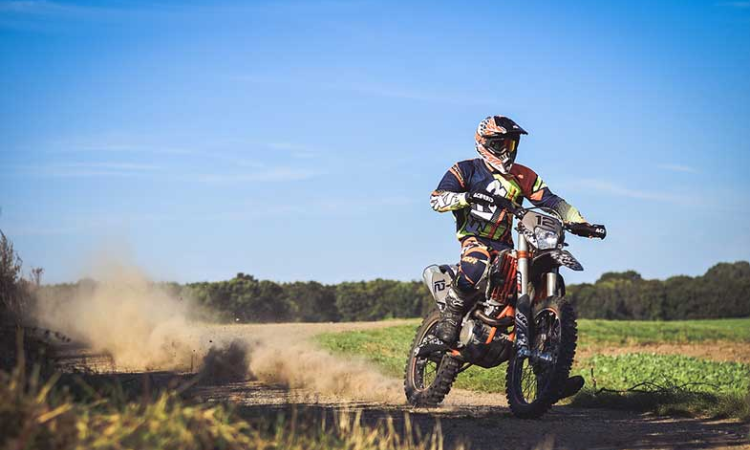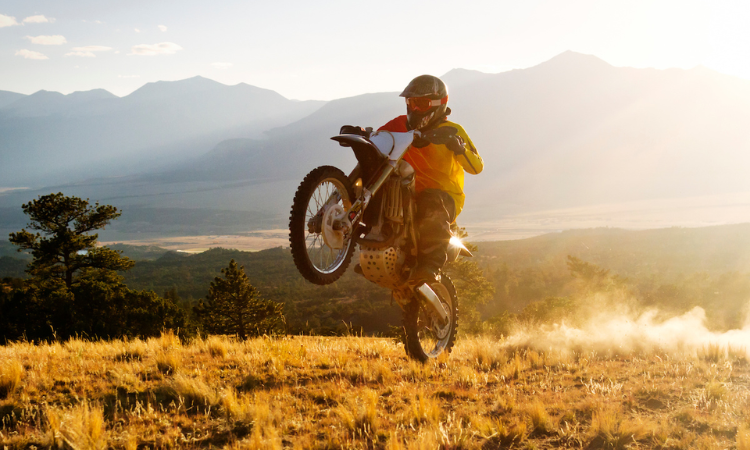Dirt bike riding refers to the leisurely or competitive utilization of off-road motorbikes, commonly referred to as dirt bikes. Dirt motorcycles are specifically engineered for utilization on non-paved terrains, encompassing dirt trails, tracks, and open fields.
Types of Dirt Bike Riders
There exists a diverse range of dirt bike riders, encompassing several categories, such as:
- Recreational riders engage in the activity of dirt bike riding primarily for leisure and physical fitness purposes. Typically, equestrians engage in riding activities on designated trails and tracks within their immediate vicinity.
- Competitive riders are individuals who actively participate in races and several other competitive events. Recreational riders generally possess less experience and training in comparison to their counterparts.
- Professional riders refer to those who have achieved a high level of expertise and skill in their respective fields of riding. These individuals have typically through extensive training and have acquired a significant These riders engage in competition at the most advanced level. Frequently, individuals embark on global journeys to partake in various races and events.
- The existence of divergent legislation pertaining to the activity of dirt bike riding
- The legislation pertaining to the activity of dirt bike riding exhibits variability across different states and countries. In certain jurisdictions, the possession of a license may be a prerequisite for operating a dirt bike, whilst in alternative jurisdictions, such a need may not be imposed.
Reasons Why You May Need a License to Ride a Dirt Bike
There exist several justifications for the requirement of a license to operate a dirt bike:
- Legal obligations: In certain jurisdictions, the possession of a license is mandated by legislation for the purpose of operating a dirt bike in public spaces. This phenomenon is commonly observed in regions characterized by dense populations and heavy vehicular movement.
- Certain states have established minimum age limits for anyone seeking to receive a license for operating a dirt bike. The standard age for this occurrence is generally 16 years, although it may vary in certain regions.
- Considerations for occupational and recreational safety: Possessing a license can serve as evidence of one’s competence and proficiency in operating a dirt bike in a manner that prioritizes safety. This holds particular significance for individuals engaged in vocational riding, particularly those who utilize dirt bikes as part of their professional activities.
Different Types of Licenses You May Need to Ride a Dirt Bike
The requisite licensure for operating a dirt bike is contingent upon the prevailing legal regulations within one’s jurisdiction. Typically, three primary categories of licenses may be required.
- The Motorized Vehicle Operator’s License (MVOP) is the predominant form of licensure necessary for operating a dirt bike. The document in question is commonly provided by the state’s Department of Motor Vehicles (DMV) and grants individuals the authorization to operate various motorized vehicles, encompassing automobiles, trucks, and motorbikes.
- The registration of Off-Highway Vehicles (OHVs) is mandated in many jurisdictions as a prerequisite for the operation of off-road vehicles, including dirt bikes. The document is commonly issued by the state Department of Motor Vehicles (DMV) or a municipal governmental entity.
- The topic of discussion pertains to the certifications and approvals related to the safety of All-Terrain Vehicles (ATVs) and Off-Highway Vehicles (OHVs). In many jurisdictions, it is mandatory for individuals operating off-highway vehicles (OHVs) to possess specific safety certifications or approvals. These qualifications can be acquired from several organizations, including the Motorcycle Safety Foundation (MSF).
Factors that Lead Towards Not Requiring a License to Ride Your Dirt Bike
There exist several elements that may contribute to the absence of a requirement for a license in order to operate a dirt bike.
- The possession of private land grants individuals the prerogative to engage in dirt bike riding without necessitating the acquisition of a license.
- Non-motorized trails refer to specific pathways that are explicitly designated for activities excluding motorized vehicles. Consequently, these trails do not necessitate the possession of a license for the operation of dirt bikes.
Obtaining Your License or Registration Before Riding in Public Areas
In order to legally operate a dirt bike in public spaces, it is necessary to acquire the requisite license or registration from the appropriate governing body. In the majority of instances, the responsible entity will be the state Department of Motor Vehicles (DMV) or a local governmental organization.
In order to acquire a license or registration, individuals are required to furnish evidence of their identity, domicile, and successful completion of a safety course. In addition, it may be necessary for individuals to successfully complete a written examination and/or a practical assessment in order to meet the requirements.

Costs Associated with Licensing, Renewal, and Registration Fees
The expenses related to licensing, renewal, and registration fees are subject to variation based on the specific state or local authority. Typically, one can anticipate a cost of several dozen dollars for the acquisition of a license or registration.
Summary
The determination of whether investing in licensure for dirt bike riding holds significance is contingent upon an individual’s own discretion. Several elements need to be taken into consideration, including the legal regulations applicable in each jurisdiction, the individual’s level of expertise, and the financial resources available.

